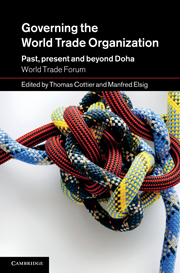Book contents
- Frontmatter
- Contents
- List of figures
- List of tables
- Notes on Contributors
- Preface
- List of abbreviations
- 1 Introduction
- PART I Setting the stage
- PART II Boundaries
- PART III Emerging and established powers
- PART IV Weaker actors
- PART V The consensus principle
- PART VI Quo vadis?
- 12 A post-Montesquieu analysis of the WTO
- 13 Reforming the WTO: the decision-making triangle revisited
- 14 Barriers to WTO reform: intellectual narrowness and the production of path-dependent thinking
- Index
- References
14 - Barriers to WTO reform: intellectual narrowness and the production of path-dependent thinking
Published online by Cambridge University Press: 07 September 2011
- Frontmatter
- Contents
- List of figures
- List of tables
- Notes on Contributors
- Preface
- List of abbreviations
- 1 Introduction
- PART I Setting the stage
- PART II Boundaries
- PART III Emerging and established powers
- PART IV Weaker actors
- PART V The consensus principle
- PART VI Quo vadis?
- 12 A post-Montesquieu analysis of the WTO
- 13 Reforming the WTO: the decision-making triangle revisited
- 14 Barriers to WTO reform: intellectual narrowness and the production of path-dependent thinking
- Index
- References
Summary
Introduction
Much time and effort has been dedicated to the issue of WTO reform. Calls for the institution's reform fill the pages of broadsheet newspapers, weekly periodicals, Internet forums, non-governmental organisation (NGO) bulletins and myriad other outlets in the run-up to, during and following a WTO Ministerial Meeting; and developing new and innovative proposals has become a staple activity in between these (supposedly) biennial events. Similarly, WTO reform has occupied the time of many a consultative group, commission, committee, practitioner, policy maker and academic alike, during moments of heightened interest in the WTO as well as during ‘quieter’ periods. The result has been a lively, if not altogether fruitful, debate.
Two aspects of the debate about WTO reform are noteworthy. First, few proposals find purchase beyond the constituencies to which they speak and for which they are produced. Of the large number of NGO and civil society organisation (CSO) proposals, for instance, only those produced by the largest and most politically acceptable receive much external attention (see, for instance, Oxfam GB 2000). Second, despite the volume of proposals produced, there is remarkably little that separates them substantively beyond a chasm between those that broadly support the idea of a world trade organisation and trade liberalisation as a vehicle for the accumulation and distribution of wealth, and those that challenge the WTO's very existence or else seek its circumscription (Bello 1999).
- Type
- Chapter
- Information
- Governing the World Trade OrganizationPast, Present and Beyond Doha, pp. 313 - 336Publisher: Cambridge University PressPrint publication year: 2011
References
- 3
- Cited by



